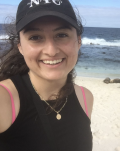Heritage Seekers
Understanding your heritage through study abroad
Overview
Many students choose to study abroad to learn more about their ancestry — these students are known as heritage seekers. Seeking information about your heritage can provide you with a first-hand account of your ancestry and new insights into your family’s language and culture. Often going to your ancestral homeland can be a very emotional experience, because you choose the location for academic fit as well as personal curiosity. Some students will be able to meet with relatives, while others will just be learning more about their ancestral history or learning the language of their families. In the same regard, some students come home feeling more connected to their ancestral roots while some students have more appreciation for their American roots.
Heritage students preparing to go abroad should be aware that many of the ideas and presumptions that they have about their host country will be challenged, so it is important to go to the country with an open mind and minimal expectations. You should be prepared to be seen as an outsider, although often a welcome one, in the local community. While you can gain rewarding insight into your heritage and family, be modest in your expectations about fitting in or having an instinctive understanding of your host country. One of the best things heritage learners can do is forget everything that they know about their home country and enter the country with an open mind.
Think about:
- How will my heritage, race, and ethnicity be perceived in the country where I study?
- Am I used to being a minority in the U.S? If so, how will it feel to be part of the majority abroad?
- Will there be other heritage students in my program?
- Will I be an ethnic minority in my host country? What percent of the population have a similar ethnic heritage to my own?
- How will I react if confronted with something offensive?
Before You Go:
- Research the customs and culture of your host country. There might be great differences between what you think you know about the home country based on how you were raised and what it is actually like.
- Learn more about other heritage students’ experiences abroad.
Heritage Seeker Resources:
- BeGlobalii has an article of Tips for Heritage Seekers Traveling Abroad
Student Stories

Gabriela Fuentes
Georgetown in Quito: Race, Gender, and Ethnicity in Latin America
Mi America en Sur America
I identify as a Chicana. The Webster dictionary definition of Chicana is “an American and especially a man or boy of Mexican descent,” but the Chicana identity is much more complex that. Therefore, my view on Ecuador is based on my previous experiences and is bound to be different and abstract. Quito, Ecuador gave me one of the warmest welcomes I have ever received. As soon as I stepped off of the airplane, I was greeted with the smell of freshly fallen rain and two new host parents who immediately embraced me in a hug and a kiss on the cheek (a traditional greeting that although I too practiced in Mexico had completely forgotten about in the U.S.). This would be the first of various cultural shocks I would come to experience and adapt to in Ecuador.
At, USFQ I took classes everyday from 8 a.m. to around 4 p.m., and the work load was heavy, but for once I was thoroughly learning the depths of my Chicana roots. The most important thing my professors taught me is that my Latin American roots do not start with the story of the conquistadors because they trace the LatinX roots to its original mother, the indigenous people of empires such as the Aztec and Inca. They introduced me to diverse genres of literature and authors like Pablo Neruda y Guaman Poma de Ayala. There is nothing more liberating than learning that my deep indigenous Aztec roots are built of head-strong warriors, innovative engineers, faithful followers of nature and spirits, upright and just communities, and lavish soil that produces innumerable amounts of rich resources.

Nadia Guamán
Chilean Universities Program in Santiago, Chile (IFSA)
Latina in Latinoamerica
¿De dónde eres? In Chile, a majority white-skinned society with a distinct accent, my brown skin and non-Chilean accent give me away as a foreigner. “De los Estados Unidos” (from the United States), I answer to confused looks. The confusion stems from an array of sources. First, many are confused by my Spanish abilities. Having grown up surrounded by and speaking Spanish my accent is of a native speaker. Therefore, their logical guess is that I am from a surrounding Spanish-speaking country. Second, there is my brown skin. Stereotypically, the exchange student from the United States is white. So when I, a woman of color, claim the United States as my home, I am subject to confused looks.
My counterparts continue to pry, asking about my status as a U.S citizen “¿Pero naciste allí?” (But, were you born there?) “¿Cuanto tiempo vives allí?” (How long have you lived there?) These questions are all in attempt to reach the information that explains my brown skin and Spanish abilities: the answer that my parents are Ecuadorian immigrants. As a first generation Latina studying abroad in Latin America I found myself constantly addressing these inquiries, defending my place in American and Ecuadorian culture.
